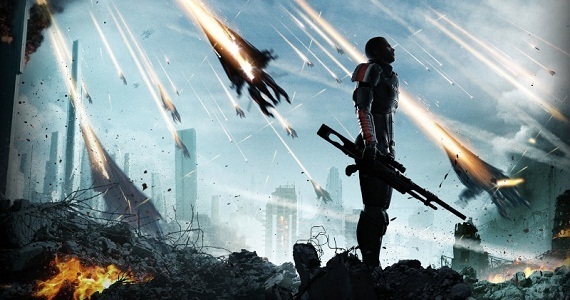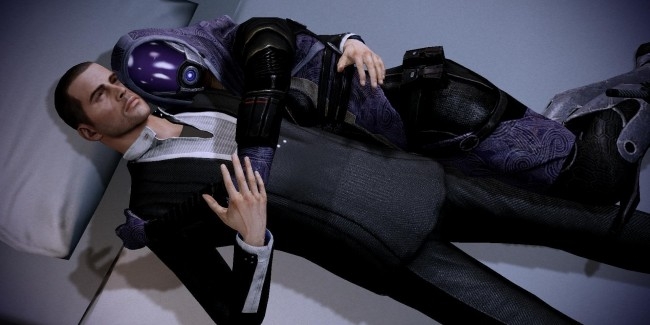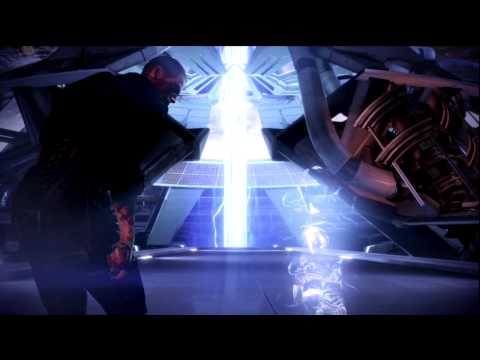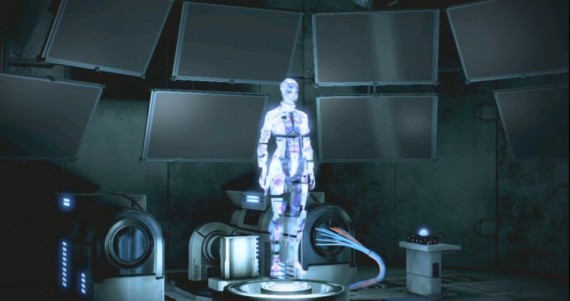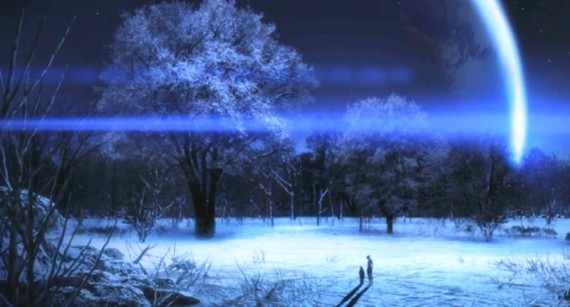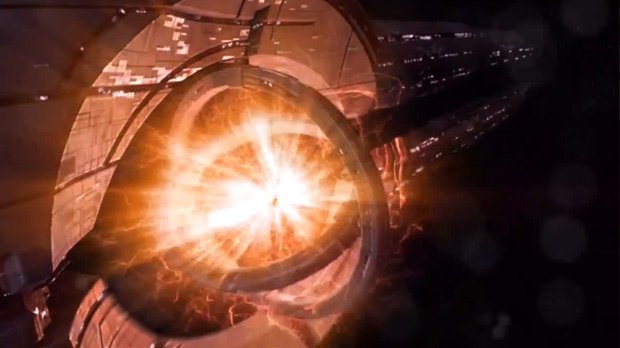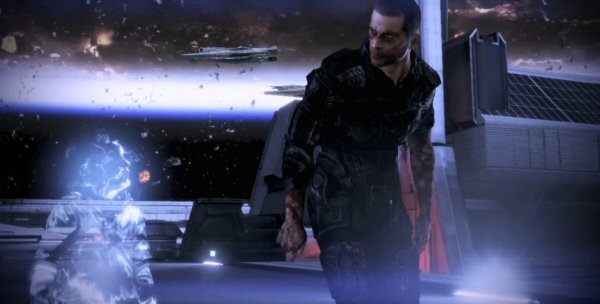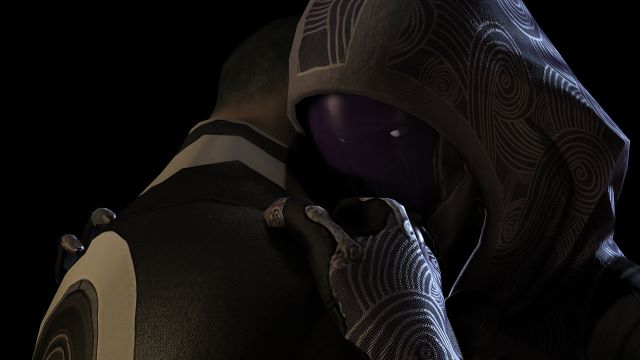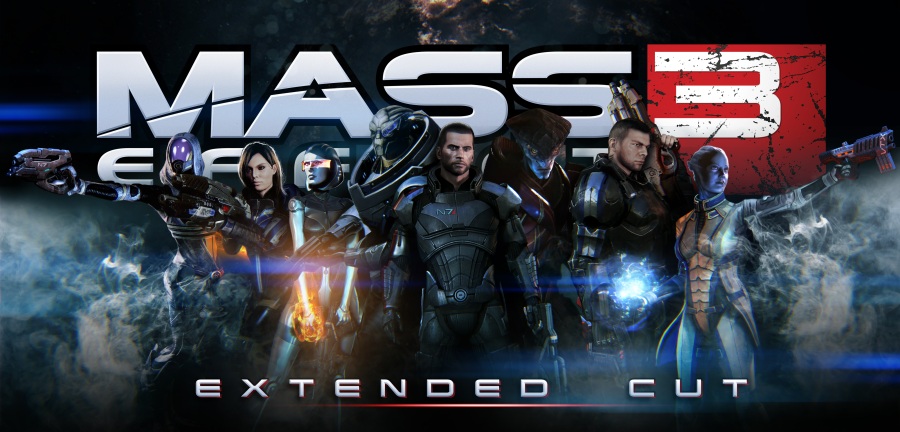
It’s hard for me to write about the Mass Effect series. Not hard in the sense that I can’t review certain aspects of it from a narrative or gameplay-driven point of view, that stuff is easy. But just talking about Mass Effect and the impact its had on me stirs emotions that are hard to deal with for a variety of reasons. It may seem silly to get bogged down in emotions related to a video game franchise, but is it really any different than being brought to tears by a film?
For the record, this entry will be fairly spoiler-heavy, so, if you haven’t yet embarked on the amazing journey BioWare/EA have afforded us with the Mass Effect trilogy, I recommend skipping this and coming back once you’ve completed the games.
In essence, the line between gaming and film are blurring rapidly, so, we should all be at the point where video games can move us to tears, should the story be powerful enough. The Mass Effect series has always whipped me into an excited frenzy, broken my heart, and finally, it’s made me cry. In a way, I’m glad the new, Extended Cut DLC exists, if only to be allowed to write (at relative length) about the one gaming franchise that has meant everything to me since the original Mass Effect was released back in 2007.
I was given the green light to go a little deeper into my life related to this series, so I’m going to do it. Mass Effect, for me, was special, if only because it was the first RPG I owned on my then-sparkly new Xbox 360. It helped that, to me, the game was perfect, wonky Mako controls and all. The game scratched my Star Trek itch of sending an away team to an unknown planet, searching for life, enemies or resources. The final battle, where Commander Shepard can literally talk his way into getting the bad guy to kill himself, felt powerful.
Mass Effect 2, for lack of a less obvious comparison, is The Empire Strikes Back of modern gaming. The story gets darker. The stakes get higher. Commander Shepard dies (and returns in glorious fashion). The cast expands.
I have a strange relationship with Mass Effect 2, in that on the same day the game came out and I got home to play it (after waiting three years or so), my father went into the hospital, suffering from a variety of symptoms. It would later be concluded that he had colon cancer, along with internal bleeding. Four months prior, my grandmother had passed away and had completely devastated him (along with the rest of us), as he sat by her bedside for days on end in the hospital. I would visit my dad, some days would be better than others, but I had my fiancée at the time to keep me focused, and I had Mass Effect 2 to play when it all became too much. While my dad fought for his life in the hospital, I was fighting The Collectors, feeling powerless to stop the cancer that invaded my father’s body.
My dad survived. Much in the way that humanity survived The Collector onslaught in Mass Effect 2. He was weakened, but he felt good. He was happy to be out of the hospital, and we were happy to have him home. We still are.
Mass Effect 3 came out back on March 6th, the day after my 28th birthday (yes, I know, I’m dating myself). My fiancée was awesome enough to sneak down to Gamestop and pay it off for me, presenting the receipt and a printout about the game as my gift at my family’s house on my birthday. 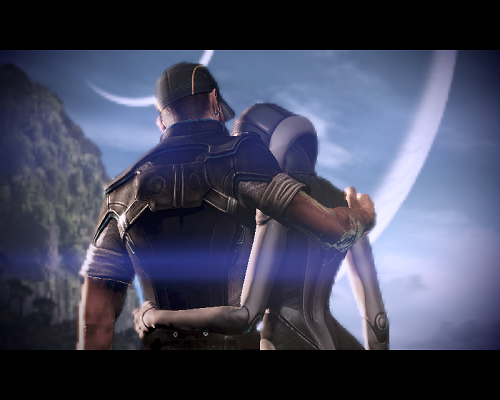 I would be going to Gamestop at midnight for the game’s release, then rushing home to play it. My duties at CHUD would have to wait, this was time for the epic conclusion to a game that I’ve worshipped this entire generation.
I would be going to Gamestop at midnight for the game’s release, then rushing home to play it. My duties at CHUD would have to wait, this was time for the epic conclusion to a game that I’ve worshipped this entire generation.
Before all the hatred towards EA and BioWare forced the companies to reevaluate their stance on Mass Effect 3’s ending, I completed the third entry in about a week, watching as my Commander Shepard chose the “Destroy” ending, feeling a blend of genuine hatred for the Reapers and synthetic life. I know this is perhaps the most controversial ending, with Shepard eliminating all synthetic life in the galaxy, Reaper or AI-construct, disregarding his own safety, for he is, after all, half-synthetic. It wasn’t easy coming to this conclusion originally. I looked at “Synthesis”, the concept of uniting organic and synthetic life into one new DNA build, or “Control”, where Shepard assumes control of the Reapers to do his bidding.
I wanted a chance for my Shepard to fly off into the sunset with his main squeeze, Tali. Influenced by her disdain for the Geth and the Reapers, “Destroy” quickly became the only option, once I took her feelings into account. Sure, this meant that EDI, the Normandy’s onboard AI-turned-corporeal squadmate would be destroyed, but it meant that organic beings would be safe from synthetic threats for a good, long while.
Once the Normandy had crashed on that tropical-looking planet, Joker and Tali emerging from its (seemingly) destroyed hull, followed by Javik, the last surviving Prothean (who had plans to kill himself at the close of the game), I knew that I made the right choice. My crew was safe. Tali was safe.
What I didn’t expect was to watch as Commander Shepard, thought dead, took one sharp breath right before smashcutting to the end credits. While I felt immediate glee knowing that my Commander Shepard was alive, sadness washed over me once I realized that the mass relays were destroyed, and travel across the galaxy was no longer an option. Tali, Joker, Javik (and whoever else survived the battle onboard the Normandy) would be stranded on that planet, and Shepard, half-alive at this point, would never see the woman he loves ever again.
My fiancée and I had been having problems. We had filmed a reality television show for Lifetime that had brought a lot of our issues to the surface. When the reality show stopped filming, and the crew left (the same folks behind The Jersey Shore), our issues remained, and we didn’t have the option of seeing our on and off-screen relationship therapist. Reality shows provide psychoanalysis as a way of helping its “stars” deal with the concept of being on-camera all the time. I, personally, hated it. I didn’t want to do it, but it was a free trip to Los Angeles (where I stood in Steven Spielberg’s shoes in front of the Chinese Theatre), where I would finally get to try In-N-Out, after yearning to try it since seeing The Big Lebowski so many years before.
Months passed by. My fiancée and I fought regularly. She couldn’t deal with the issues raised on the reality show, even though I had a normal 9-5 job and wasn’t the pothead “gamer” I was painted to be. It was like she was brainwashed by the nonsense presented on-screen, completely disregarding who I was in reality.
Not long after I finished Mass Effect 3, my fiancée and I, unable to reconcile our differences, broke up.
I think that’s part of what colored my view of Mass Effect 3 for so long. Knowing that my life had literally fallen apart after I chose to destroy the Reapers. It was like real life was reacting to my morality in the same way BioWare promised that Shepard’s morality would influence the game-world’s. I know, this sounds silly, but it’s true. I had tried to be a Paragon in a world where the Renegade succeeds. A society where bad behavior is encouraged and we reward children’s failure with gold stars and “Everyone’s A Winner” ribbons on Field Day.
I studied Mass Effect 3’s other endings. I avoided as much writing on the subject as I could. “Synthesis” seemed like the canon ending BioWare wanted their world to have, but it felt like a cop out. That ending seems as close to a deus ex machina as possible, which feels cheap to me. “Control” just felt wrong. Shepard would never want to control as destructive a force as the Reapers. If anyone knows the frailty of human nature, it’s a man who’s seen war head-on and has lived close to death since the beginning of the war with the Reapers (and before, should you choose the right origin story for your character).
I never felt that BioWare owed me anything. I was fine with my doubly-broken heart. The tears I cried were enough for me. The endings had done their job. They made an impact. All good science fiction does that.
When word from Casey Hudson (executive producer at BioWare) came that the team had begun working on “exciting new gameplay initiatives” that would answer a lot of the lingering questions and aid in expounding upon the somewhat nebulous nature of Mass Effect 3’s endings, I wasn’t happy. An artist should never be asked to change his vision, regardless of the medium. If they want to go back and change it, they are more than welcomed to, however; for fans to decide that the endings weren’t good enough and demand something new is absurd. The fact that BioWare caved and decided to give in to the fans is perhaps the saddest event in gaming history.
I wanted a happy ending. I wanted Shepard and Tali to build their home on Rannoch (the Quarian homeworld) and live together forever. I wanted that in reality, too. But it wasn’t to be. Shepard (and to a point, myself) had a date with destiny and made a decision that altered the future he was planning for so long.
Fans waited. In the meantime, BioWare released free map packs for the multiplayer, which, although fun, is completely unnecessary. I, personally, don’t play it, though I thrive on the Mass Effect universe. I downloaded the maps. I waited for these new endings. When word of an actual release date (which you can read about here, by CHUD’s own wordsmith, Justin Clark) came, I began getting nervous. Since closing the book on my Mass Effect journey, I had moved back home, began writing for more online and print outlets, and started dating again.
Would playing through Mass Effect 3’s new endings reawaken those old feelings of sadness and rejection? Failure and triumph? Would I cry again?
Of all the additions to the game, perhaps the most out of left field is the “Rejection/Refusal” ending. In it, Commander Shepard makes the improbable stance of doing nothing to stop the Reapers. Earth is apparently glassed, the Alliance, wiped out. The Normandy and her crew are … nowhere to be found. No crash landing on a beautiful planet alive with greenery. All that we get is a hologram transmission from Dr. Liara T’soni, leaving a message on how to build the Crucible (the ultimate weapon to stop the Reapers) and make it work so whatever future civilizations don’t make the same mistake Shepard and the rest of the galaxy did.
Also new to this ending is a different version of the Stargazer sequence that closes out the other three endings. Gone is Buzz Aldrin’s beautiful dialogue about mankind reaching for the stars while walking in a valley with a child, talking about “The Shepard”. In its place, we get a female Stargazer that some have hinted at as being Asari (though I, personally, don’t buy it), talking about how the messages and archives left behind by the previous generation have allowed the current one to thrive.
In the end, the “Rejection/Refusal” ending makes no sense. Shepard stands for the hopes and dreams of the galaxy, and has also proven him/herself to be a man/woman of action, so the fact that he/she wouldn’t be able to make a decision that effects the entire galaxy is a cheat not dissimilar from “Synthesis”, only instead of a magical resolution, it’s a complete neutering of choice. By showing Liara’s message (which she had been working on the entire game), it gives the player a sense that the world is gone. If life exists, they couldn’t possibly find this artifact and learn of its teachings. But the Stargazer sequence betrays this and basically says “Nope, everything worked out, thanks for playing.” It reminds me of that bizarre sequence in Shyamalan’s The Village where its revealed that the monsters are fake, then we see that they might be real, and then, nope, it’s Adrien Brody in a costume.
While I may have written the “Synthesis” ending off as a deus ex machina, it is also perhaps the most selfless of endings, with Shepard killing him/herself in an effort to bring life together. It’s a beautiful metaphor found in just about every great piece of literature from The Bible to Watchmen (that’s a pretty large leap, I know) where sacrifice plays a key role to humanity’s survival. The stakes are obviously higher in Mass Effect, as the fate of multiple races hangs in the balance, but you get the point.
“Control” is completely unacceptable to me. Shepard now narrates a slightly disturbing post-script talking about living life eternal, and understanding the purpose of life in the galaxy. While the Catalyst promised Shepard that his thoughts and memories would remain and that he would, in fact, continue to live in the form of feelings and emotions controlling the Reapers, this doesn’t seem to be the case. Shepard acknowledges him/herself as a being and not as someone who remembers the cost of what it took to save the galaxy. While “Shepard”s dialogue states that he or she remembers what it took, it just feels hollow and a betrayal of narrative.
The “Destruction” ending is the ending I chose for Shepard and company. It’s the ending that made most sense for my prime Shepard playthrough. As strange as this may be, with Lance Henriksen’s narration, the idea of synthetics rising again to threaten the galaxy doesn’t seem to be the case, as The Catalyst said. In actuality, it seems more akin to the notion that the galactic community has learned from its mistakes and will work together to foster a continued coexistence with one-another.
There are some fantastic differences between the three original paths one can take, each regarding some of the peripheral characters and squadmates. The individual decisions Shepard made throughout the game are also reflected nicely, for example, if you chose to cure the Krogan genophage, you get to see some Krogan children, and even, a Krogan baby (which is as cute as it sounds, believe me). It’s also nice to see characters like Jacob and Zaeed again, living their post-war lives. This is perhaps the biggest complaint I had, not knowing what happened to the characters I grew so attached to over the course of three games.
Watching Shepard disintegrate into that greenish-white light, assume control of the most devastating force the galaxy has ever known, or take a breath among the wreckage of the Catalyst is saddening, if only because it’s definitive proof that the series is over (regardless of whatever spinoffs there are). It’s hard to reconcile. I don’t want my time in the Mass Effect universe to be over. I feel like I’ve lost too much over the years to lose the one video game franchise I worship in the same way that I worship Bret Easton Ellis’ Less Than Zero, the novel I claim changed my life. Mass Effect changed my life for the better, and was there for me at my saddest and most desperate times. I lost the woman I loved after watching Shepard lose the woman he loves. The Collectors almost killed humanity in the same way that cancer almost claimed my father.
How can I rally from this? Video games, like art, are subjective. Mass Effect, to me, is the greatest science fiction franchise that has ever existed. Haters be damned, it’s just how I feel. I grew up worshipping George Lucas like we all did/do, but I don’t hold onto my love of Star Wars anymore. Mass Effect will never leave that place in my heart. I keep it tucked away. I’ll carry it with me until the day I can maybe make a sacrifice that saves humanity.
What inspires me most about the “Destroy” ending (other than Shepard turning out to be alive) is that the mass relays aren’t truly gone. There is hope. Shepard and Tali might see eachother again. It makes me happy to continue their adventures in the theatre of the mind as they build a homestead and make beautiful half-Quarian, half-human babies.
